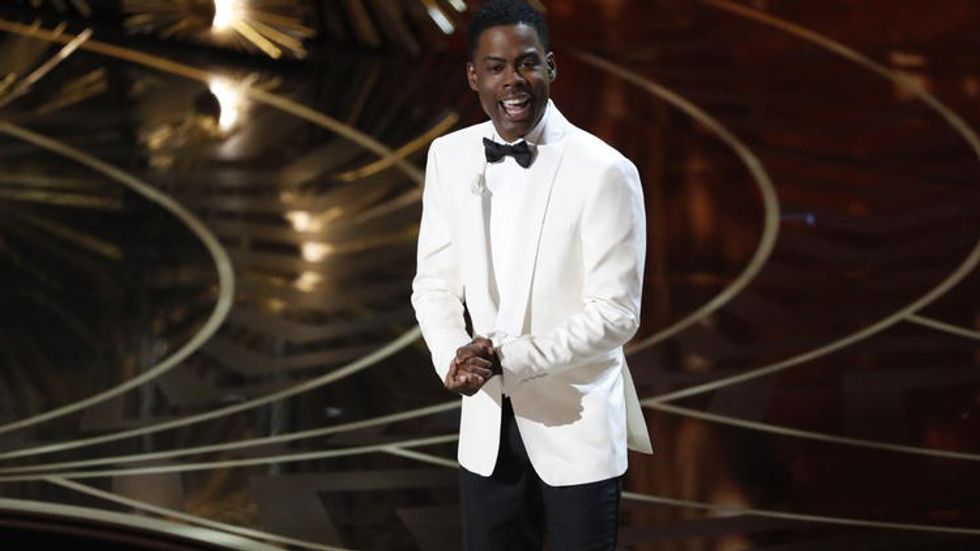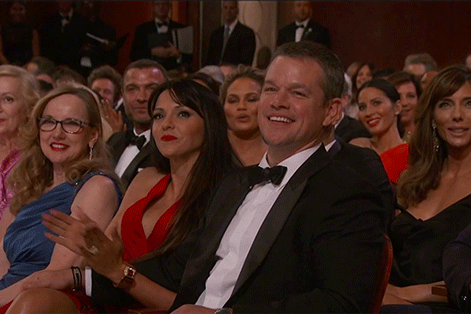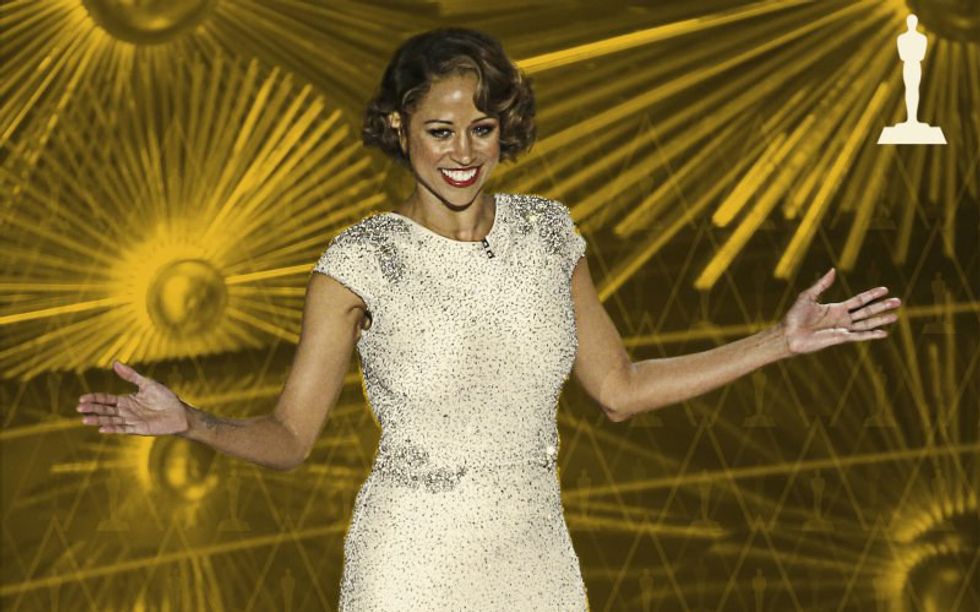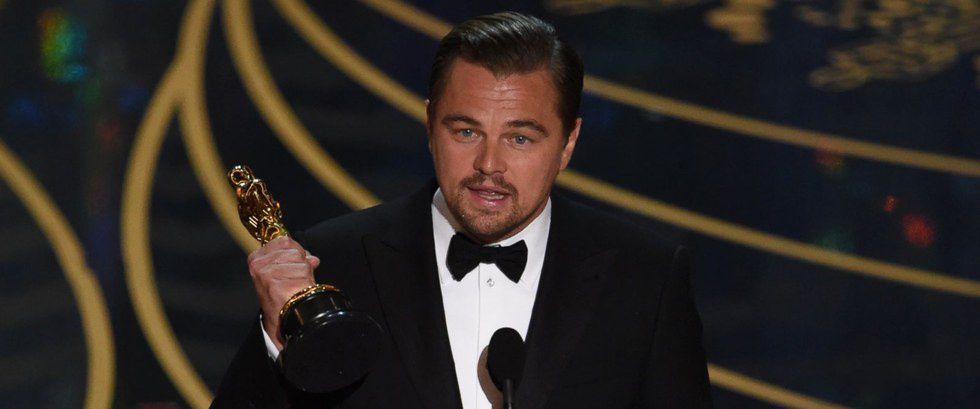“I’m here at the Academy Awards, otherwise known as the White People’s Choice Awards," Chris Rock said.
Those were the first lines of Rock’s 10-minute opening monologue as the host of the 88th Annual Academy Awards. Amid the #OscarsSoWhite campaign that began after no actor of color was nominated for an Academy Award for the second year in a row, Rock’s monologue was a mixed bag of messages—which would set the rough tone for the rest of the night. (Here's the transcript to the full monologue)
Rock’s monologue hit on everything from the absurdity of Jada Pinkett Smith boycotting the Oscars to the real problem of African-American actors not being allowed to choose from a diverse set of roles (like a Leonardo DiCaprio). But, the disconnect came from Rock and the audience to whom he was delivering his messages. As an audience member at home, Rock’s monologue came from a place of privilege.
"I'm sure there wasn't no black nominees some of those years, say '62 or '63. And black people did not protest. Why? Because we had real things to protest at the time. We had real things to protest!" Rock said.
But that line of thinking, a common argument against the Oscars protest, is disregarding the importance of representation—not only for audience members but for the actors themselves. People are still protesting the police violence and discrimination on the streets. As an Asian-American, an underrepresented minority in media, I saw firsthand how important and gratifying the emotions expressed by my peers can be, and that was just from a sitcom on ABC.
Rock further showed his privilege through a diversion into sexism. He noted how interviewers are no longer allowed to ask actresses solely which designer they're wearing and that posing such questions is not inherently sexist:
"Every guy in here is wearing the exact same thing," Rock said. "If George Clooney showed up with a lime green tux on and a swan coming out his ass, someone would go, 'What you wearing George?'"
That’s a tough pill to swallow, mainly because if you watch the pre-show, that is still the most common question on the red carpet. Already, there is a “Hot or Not” and “Who Wore It Best” online, featuring mostly women.
And while Chris Rock seemed to be on a different plane than the audience at home, he seemed even more disconnected with the audience in the Dolby Theatre. The one thing that was evidently clear was that the audience, filled with Hollywood's elites, seemed to believe that none of the jokes were about them. They were about everyone but them. Rock’s delivery seemed to be poking fun of the unconscious bias while also rubbing elbows with the aforementioned Hollywood elite.
Look at Matt Damon clapping in the GIF above after a jab by Chris Rock. This is coming from a Hollywood elitist who, just in September of last year, committed a sin in unconscious bias during an episode of “Project Greenlight.” When a black producer tried to advocate for a directing duo of an Asian and female director, Damon stopped her in her tracks to advocate for a white filmmaker citing merit. The result is that Jason Mann, the white director, made a critically panned film for HBO, whose place of privilege on the reality show was an arc throughout the series.
The rest of the night presented the same type of uncomfortable unconscious bias. When Chris Rock jokingly presented Stacey Dash, who earlier this year appeared on Fox News criticizing the #OscarsSoWhite movement and asked for the nation to rebuke Black History Month as the new Director of the Minority Outreach Program. The room fell into a silence. But when Rock presented the PricewaterhouseCooper “accountants” who do the Oscar balloting, and Asian children came out, the room laughed. A room filled with millionaires who did not allow themselves to laugh at Stacey Dash allowed themselves to laugh at a child labor, Asians-are-good-at-math joke.
This is not saying that Hollywood is racist. The most poignant moment of Rock’s monologue is his explanation of the different sorts of racism the Oscars present.
"You see all these writers and producers and actors — they don't hire black people. And they're the nicest white people on Earth. They're liberals. Is Hollywood racist? You damn right Hollywood’s racist, but it ain't the racist that you’ve grown accustomed to. Hollywood is sorority racist. It’s like, 'We like you Rhonda, but you’re not a Kappa.'"
Rock has never been more right than in pointing out the type of racism Hollywood precipitates. This is the same awards show that celebrates the liberal ideology of “The Big Short” and “Spotlight.” In one of the most moving moments of the night, a group of sexual violence survivors came together during Lady Gaga’s performance of her Oscar-nominated song, “Til it Happens to You." This is also the same show that cut to a person of color every time Chris Rock made a poignant joke about race and took cheap shots at Will Smith’s decision to boycott the Academy Awards.
At a certain point, the narrative of the show was not about who was winning. “Mad Max: Fury Road” garnered six awards, the most of the night — mainly the technical ones like Best Costume Design and Best Film Editing. Alejandro G. Iñárritu, a Mexican filmmaker, won for "The Revenant," becoming the first filmmaker since Joseph Mankiewicz in 1950 to win Best Director two years in a row. “Spotlight” took home Best Picture. In the acting categories, Mark Rylance won Best Supporting Actor for “Bridge of Spies,” and Alicia Vikander won Best Supporting Actress for “The Danish Girl.” Brie Larson unsurprisingly took home the Best Actress Oscar for "The Room," and Leonardo DiCaprio finally won his Oscar for Best Actor in “The Revenant.”
And it is fitting that DiCaprio would receive a standing ovation for his win. Whether he deserves his Oscar or not, the celebration of him winning is indicative of how hard it is for actors of color to get diverse roles that warrant Oscar consideration. The narrative surrounding DiCaprio is how long and how good he has been without ever having received an award — despite nominations for his roles in “The Wolf of Wall Street,” “The Aviator,” “Blood Diamond” and so forth and so forth. It only goes to show how often he has had the opportunities to play "worthy" roles. Of all the speaking roles in film last year, African Americans made up of 12 percent and Asians only made up 5.3 percent of characters. White roles made up of 73 percent of all speaking roles in movies. This is only speaking roles and does not consider the importance of the role. There are only so many roles for people of color to get.
#OscarsSoWhite should not die just because the Academy Awards are over. Rather, it should shift to #HollywoodSoWhite. The conversation has been set to diversify roles Hollywood has to offer. Cheryl Boone Isaacs, the African-American female president of the Academy, made the call to diversify our film screens. Hopefully, Hollywood will take heed.
























